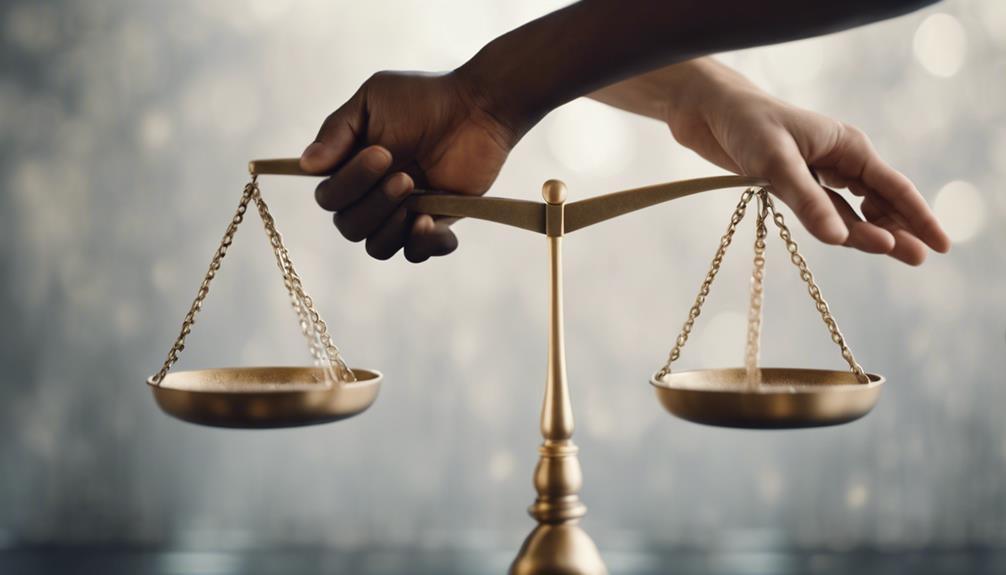
In the vast tapestry of existence, one cannot ignore the intricate threads of equality that weave through our collective consciousness. The law of equality beckons us to ponder the very essence of our interconnectedness, challenging us to reflect on the divine balance that underpins the universe. As we journey through the corridors of life, understanding this law not only shapes our interactions with others but also reveals profound truths about our own existence. Embracing the principles of equality is akin to undertaking a spiritual quest, unraveling the mysteries of existence and our place within it.
Importance of Understanding Equality
In the pursuit of societal harmony and justice, a profound comprehension of the principle of equality stands as a beacon guiding individuals towards a domain of fairness and inclusivity. Understanding equality is not merely an essential concept but a fundamental pillar upon which human rights, the rule of law, equal protection, and gender equality are upheld. It serves as the moral compass that directs individuals and societies towards a more just and equitable existence.
Human rights, enshrined in international law, are built upon the foundation of equality. The notion that all individuals are entitled to the same inherent rights and dignity forms the bedrock of a just society. Without a deep understanding of equality, these rights can easily be eroded, leading to systemic injustices and discrimination.
Moreover, the rule of law, a principle that no one is above the law and all are subject to it, is predicated on the concept of equality before the law. Equal protection under the law ensures that justice is administered impartially, without favoritism or bias based on factors such as gender, race, or socioeconomic status.
Gender equality, an important aspect of understanding equality, calls for the elimination of discrimination based on gender and the promotion of equal opportunities for all individuals, regardless of their gender identity. Embracing gender equality requires a deep understanding of the inherent worth and rights of every individual, irrespective of gender.
In essence, comprehending the principle of equality is not just a moral imperative but a practical necessity for creating a more just, inclusive, and harmonious society.
Legal Implications of Equality
Within the intricate tapestry of legal frameworks and societal structures, the embodiment of equality resonates as a foundational principle shaping the very essence of justice and fairness. Equality before the law stands as a beacon of hope, ensuring that every individual, regardless of background or standing, is held to the same standards of accountability. This principle not only guarantees fair access to legal protections but also upholds the pillars of an impartial judiciary and equal treatment in legal proceedings.
In the domain of civil rights, the legal implications of equality extend far and wide, touching the lives of all human beings. Upholding equality in the justice system is not merely a matter of compliance; it is a moral imperative that promotes fairness, justice, and trust among diverse groups within society. By preventing arbitrary actions, fostering social cohesion, and safeguarding fundamental human rights and freedoms, equality before the law paves the way for a more just and harmonious world.
Moreover, the principle of equality under the law is a cornerstone for the preservation of the rule of law, preventing the abuse of power, and sustaining democratic governance. It serves as a reminder that every individual, irrespective of their background, deserves equal access to justice and protection under the law. In embracing the legal implications of equality, we move closer to realizing a society where justice is not just a lofty ideal but a lived reality for all.
Social Justice and Equality

Amidst the fabric of legal frameworks and societal structures, the intertwining threads of social justice and equality weave a tapestry of interconnectedness that illuminates the path towards a more harmonious and equitable world. The Universal Declaration stands as a beacon, calling for the fair treatment of all groups of people, yet the shadows of inequality persist, casting a pall over our shared humanity.
Unequal treatment based on gender, race, and socioeconomic status plagues our societies, breeding poverty and limiting opportunities for countless individuals. Women, particularly those in the 25-34 age group, bear a disproportionate burden of poverty, underscoring the urgent need to bridge the gender gap. Discrimination rears its ugly head in the domains of healthcare and education, denying certain groups access to fundamental rights and perpetuating cycles of disadvantage.
The scales of justice, as held by the Supreme Court, often tip unevenly, with marginalized communities bearing the brunt of systemic injustices. Disparities in arrests and convictions reveal cracks in the foundation of our legal system, with Black Americans facing disproportionate consequences. The call for reform echoes through courtrooms and corridors of power, urging a reckoning with the shadows that darken the path to true equality and justice.
Equality in Human Rights
Embracing the essence of interconnectedness within the sphere of human rights, the pursuit of equality stands as a cornerstone in the edifice of societal harmony and justice. In the domain of human rights, every individual, regardless of gender, race, or beliefs, should be equally protected under the legal system, fostering a world where the intrinsic value of each person is recognized and honored.
The significance of equality in human rights:
- Dismantling Discrimination: Gender discrimination, disability discrimination, and poverty threaten the very fabric of human rights, obstructing the path to a just society.
- Foundations in Declarations: The Universal Declaration of Human Rights underscores equality as a fundamental principle, setting the stage for a world where the rights of all individuals are respected and upheld.
- Constitutional Commitments: With over 150 national constitutions explicitly mentioning gender equality, the legal framework is evolving to make certain that the rights of women and men are equally safeguarded.
- Barrier to Fulfillment: Discrimination in any form poses a significant barrier to the realization of human rights, impeding the full potential and well-being of individuals.
- Necessity for Flourishing Rights: Tackling inequality is not just a moral imperative but a pragmatic necessity for human rights to flourish and for societies to thrive in unity and respect for all.
In the pursuit of a just and equitable world, the principle of equality in human rights serves as the guiding light towards a future where every individual can live a life of dignity and freedom.
Building an Equitable Society

In the quest for societal harmony and justice, understanding and embodying the principles of equity paves the way towards a fair and inclusive community for all individuals. Equity transcends mere equality; it explores the depths of fairness and justice, ensuring that every individual, including Black people who have historically faced systemic injustices, is given the opportunity to thrive.
Building an equitable society necessitates a reevaluation of power dynamics. It requires us to limit the power held by a select few and distribute it equitably among all members of society. This redistribution of power is not about diminishing the capabilities of some but about uplifting the marginalized and ensuring that the benefits of a just society apply to everyone.
In the domain of law, the concept of equity extends beyond public statutes to the realm of private law. It calls for fairness not only in the eyes of the legal system but also in everyday interactions and transactions. Embracing equity in private law means that contracts, property rights, and business dealings must be conducted with a sense of justice and impartiality, ensuring that the principles of equity apply to every individual, irrespective of their background or status.
Conclusion
To wrap up, the pursuit of equality is not just a legal obligation but a moral imperative that transcends societal norms and individual biases.
By understanding and upholding the principles of equality, we contribute to the creation of a more just and harmonious world where all individuals are treated with dignity and respect.
For example, the landmark case of Brown v. Board of Education in the United States underscored the importance of equality in education and paved the way for desegregation in schools, promoting a more equitable society.


